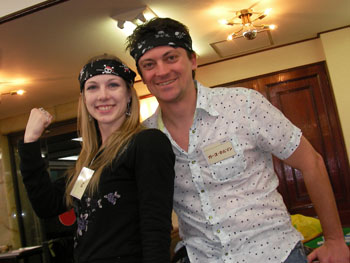Jenn’s Corner #7: Gambling

Did everyone see the new Glossary? If you didn’t then you should definitely check it out here! It has all of the terms we have used on the page up until close to the end of January. Keep checking back for additional terms (we will be adding at least monthly with terms that we have used on the site) and also for a Japanese Romaji cross-reference! That way we can all understand the same terms and use the terms we are most comfortable with!
I want to talk about something that is important in the world of Mahjong; Gambling. Betting money on games has a very distinct image and in many places, the image is not good. In Japan, Gambling is mostly illegal. I say mostly because thanks to loopholes gamblers can still get their fix in Pachinko Parlors, at Horse Races, Bike Races, Boat Races, through Lottery and yes, in Mahjong Parlors as well. It kind of makes me wonder what part of Gambling, exactly, is illegal. There are, of course, no [advertised] casinos that give you the chance to lose money at Roulette, Black Jack, Poker or Baccarat (although it is possible to fill your cravings for these fixed games at underground casinos secretly). For legitimate gambling in those areas, everyone flocks to Las Vegas or Macau.
But lately, Mahjong is changing from its smoke-filled, beer-drenched, high-stakes “bad-ass” image to one of healthy competition, attracting a quite different but equally welcome crowd. To be perfectly honest, I am all for both images. Although I don’t like smoke in the poorly filtered hole-in-wall Mahjong Parlors that I frequent, I do appreciate that such a complicated game that requires a great deal of intelligence can have a “cool” image. The Japan Professional Mahjong League has announced that all JPML competitions will be non-smoking starting with the first competition in April. How exciting! Now maybe my contact lenses will hold up for all of the games. And in professional tournaments, while we are not betting money like in cash games, there are almost always cash prize purses, tournaments that allow amateurs reaching about 120,000 yen for first place (close to $10,000 U.S.). And you will rarely find a rate-free Mahjong Parlor, though they do exist.
Most Professional players got that way by playing for money. It is a popular belief among many of the old hands and their disciples that Mahjong, like Poker, uses money to keep score, and a more popular one that if something is not at stake, then not only does the gambling aspect increase and skill level decrease, but there is no hope of improving your game. At times I am torn… I do believe that people can improve without betting money, but I also believe that if all Mahjong games you play are “just for fun” then that is what you are playing the game for. That is perfectly fine. Mahjong is a game and it should be fun. There is no reason that everyone must participate in “gambling” in order to have fun at the Mahjong table. But, I also believe that it is hard to find people playing “for real” even if there is no risk of losing something. There are the golden few, but most people change the way they play when money is involved. In serious games and to make sure your opponents are serious, many people believe that it is better to use cash to count, even if it is a small amount.
Anyone who plays online poker will understand. When you play Poker for play money, the best hand usually wins the game, making it a game of luck and true gambling. When you play for real money, the most skillful player wins in the long run, using bets and tricks to let their opponents fold hands, proving that Poker is a skill game and not an actual gamble. In Mahjong, it is easy to come to the conclusion that the fastest hand will win in no-rate games, increasing the luck factor, since less people will fold hands. If the risk, however, is greater, people will tend to fold more, giving bigger hands and the players who wield them the edge.
It is a touchy subject for some and since most public Mahjong in the world outside of Japan right now has little to no cash involved; it is difficult to get everyone on the same side.
I will leave you all with this image though. All of the World Champions that you have heard of that came from Japan, us Americans that live in the center of the Reach Mahjong world here in Tokyo (including Garthe, I and a few of our buddies over here), and most professional players, rarely even practice without a rate attached and it has proved strength in the World beyond our doors.

In other news, last month Garthe and I participated in Saikouisen’s (another pro group in Japan) Pair Match. Aren’t we cute?
To post comments to this column, click here.

